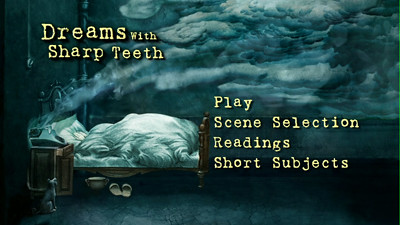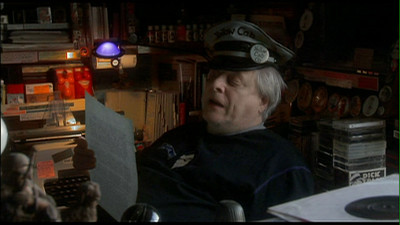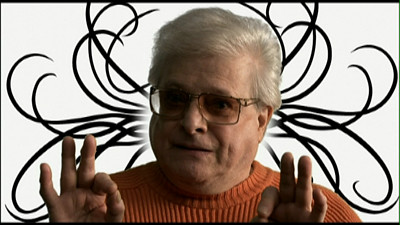Breaking from convention slightly, I am posting the main body of one of my DVD reviews here. I think the special nature of this one deserved a reprint. I had a lot of fun writing it.
(I've actually toyed with posting full reviews here more often, but I think the blog would get flooded if I did them all, so I stick to the lists of links.)
For the full review, visit DVD Talk.

I am having a hard time reviewing the documentary Harlan Ellison: Dreams With Sharp Teeth, Erik Nelson's portrait of one of the most gifted writers of the last eighty years. I find myself pulling away from the material and wanting to instead write about my own interaction with the writer and his work, to act as a de facto commentator and tell you all the things I would have said were I lucky enough to sit down in front of Nelson's camera. The only explanation I have for it is one given by a Carol Cooper, critic for The Village Voice and someone who actually was asked to share her thoughts on Harlan for the movie. In pondering Harlan's long-standing feud with fandom of all kinds, she notes that his problem with fanboys is that they have removed themselves from interaction with anything beyond that which they are fans of, and to understand Harlan's work and its meaning is to be the opposite. It requires engagement, not just with the printed matter, but with life.
Now that I think about it, there are multiple instances in Dreams With Sharp Teeth where someone shares their Harlan Ellison encounter or how he inspired them to be something more, and I thought, "Me, too." Sometimes it's an outside anecdote, like noted comics writer and author Neil Gaiman laughing about being on a panel with Harlan when a member of the audience approached Ellison with the seeming intent of raising the writer's ire and reveling in the verbal blast that followed. While I have never done this, having noted the fatigue it actually caused the man when, as a teen, I used to quietly hang around his appearances in Los Angeles, too shy to speak, I have had my moment where I took a secret thrill in receiving an insult from him. Even better, it was a comeback to my own quip. It was in my early days at Dark Horse Comics, when as an editorial assistant I did whatever I could to insinuate myself into the production of Harlan Ellison's Dream Corridor. I was not all that impressed with some of the cover illustrations Harlan had commissioned, and I tossed out a jibe saying just that. My own words are lost to memory, they weren't important to me, but I believe it was something to the effect that when Harlan was praising his own good taste, I shot back with something resembling, "Yeah, like such-and-such a painting proves," my snot-nosed disdain clear by the smirk on which it hung. The room froze, people's eyes gleefully widened and ears opened as they waited for me to get mine in return. Harlan looked at me, his expression dry, and he casually reached a finger up to his lower eyelid and pulled it down ever so gently. "Child," he said, "look into my eye...." His words trailed off, he did not need to speak the finish. "Do you see death?"
I still smile when I think about it. I am smiling now. Notice how much more charged my writing is when I write about Harlan? My skills, such as they are, can be traced back to my discovery of his work when I was 15. I've still got two bookshelves filled with his material, and I don't even have close to a complete collection. I had seen Harlan before I had read him, he was a guest of honor at my first ever Comic Con in San Diego, around 1986 or 1987. I wandered into a room where he was speaking, it was packed to the rafters, and whatever tale Harlan was telling, the audience was in hysterics. All except for one lady in the back of the room who had her arms folded and was shaking her head, insisting to a friend who was jabbing her with an elbow, "It's not funny. It's not funny." Such opposite yet equally energetic reactions! I was fascinated.

Writer Josh Olson, who wrote the screen version of A History of Violence and adapted Harlan's story "The Discarded" for the short-lived Masters of Science Fiction television show, tells of his own first encounter with Harlan's work. He holds up a dog-eared copy of the paperback edition of the short story collection Ellison Wonderland and tells how one of his high school teachers gave it to him. She saw something in Josh that she felt was in need of knowing who Harlan Ellison was. He said it was the moment he knew writing was what he wanted to do for a living. While I was on the writerly path before I had ever read a word by Harlan, I didn't really know how far I could take it artistically until his prose passed under my nose.
It was 10th grade for me, a short story unit in my English class. I went through what our library had to offer in search of something that wouldn't bore me to tears. The card catalogue said Quartz Hill High was supposed to have a copy of The Deathbird Stories in the stacks, but it was checked out. I ended up with Ray Bradbury, which at the time wasn't really my cup of tea, but I knew the title of the lead story from a Twilight Zone episode. Long story already too long, that book didn't hit the spot, and so when Deathbird came back, I snagged it. My teacher, Miss Black, saw me reading it when I should have been reading something else, and she wrinkled her nose at the offending tome. "Do you like that?" she asked, possibly confirming some long-held suspicion about me and my mental health.
"Oh, yes," I replied, her obvious disgust making the book more exciting already, just the way that woman at Comic Con's vehement refusal to laugh had made Harlan seem like a rock star.
"I have a copy of that at home," Miss Black said. "If I can find it, I'll give it to you."
That was how I ended up with my own first edition hardcover of The Deathbird Stories, a collection of similarly themed pieces, all of them about some kind of modern god, the new things of worship that were replacing the old. If Miss Black were to give me that book today, she'd be fired. It's a pretty wild work of fiction, full of extreme ideas and frightening images, but also rife with humanity and moments of true tenderness--the dichotomy that makes all of Ellison's best work his best work. It changed my life immeasurably. I had a whole new understanding of what words could do. There were actually three stories I wrote while reading The Deathbird Stories, and while they were all terrible, I was aware of the changing tenor of what I put on a page. There was a difference between the story I wrote before starting the book and the one I wrote in the middle, and the third, written after, was a whole other thing entirely. I became a real writer in the space of probably thirty or so typewritten pages.
I tried to tell Harlan this at another Comic Con years later, when I actually got him to sign that copy of The Deathbird Stories. I screwed up my courage, wanted to tell the man how I felt, got about as far as "It's the first book of yours I read, and--" when Harlan dismissively waved his hand and said, "Yeah, yeah, it changed your life. I know."
It was at once shocking and disappointing, and yet, as he handed me back the book, he gave me a sprightly wink and said, "You're all right, kid," sending me away feeling good about having come by. That's Harlan.

Just as now I wave my hand dismissively at you, a cursory brush-off across the internet, as you start to get annoyed with me and say, "That's all well and good, but what about the damned movie?!" How impatient you are! What you need to understand is that this is all about the damned movie. Reviewing a film shouldn't just be about watching it and regurgitating a summary, but as Carol Cooper said, it should be an interaction, one should engage the material. Any reviewer who has read Ellison's own books of criticism, either the movie oriented Harlan Ellison's Watching or the series of television-related essays in the two The Glass Teat volumes or any of his other countless works of non-fiction essaying (Harlan Ellison's Hornbook or An Edge in My Voice, for instance) know that the master himself is prone to such digressions. I can simply review Dreams With Sharp Teeth in the same old way and you can walk away with my impressions, but how accurately will you know where I am coming from if I don't tell you what else is on my mind?
When we strip away all the extraneous nonsense and get down to the meat of the nut, to go off on such a tangent is the only way I can prepare you for the man you will encounter in this movie. And this movie itself is really only there to prepare you for what you will find if you choose to go deeper into Ellison Wonderland. And I don't see how you can't, unless you're that woman I saw in my teen years, so adamant in your determination to spoil whatever good time might come your way. Because if you watch the ninety-six minutes of Ellison ranting and raving, listen to the stories others tell about him, and best of all, hear him read from a selection of his work, and you don't want to go out and buy one of his books, then I am not sure I understand who you are. To paraphrase from memory, a remembered line from an essay Ellison wrote about the excitement of discovery experienced by NASA scientists when they find something new in space, if the person next to you doesn't get how grand that is, then get rid of them. If it's your fiancée, give back the ring. It's through.
Oh, the stories you will hear here! There is the introduction to Harlan's piece about when he marched in Alabama with Dr. Martin Luther King, a meaningful passage from his childhood memoir "One Life Furnished in Early Poverty," a vivid reading of his famous tale of nonconformity, "'Repent, Harlequin!' Said the Ticktockman," and strangely, the most exciting and the most poignant, a dramatic interpretation of a segment of his butchered script for the Star Trek episode "The City on the Edge of Forever." It's just Harlan standing there, staring into Erik Nelson's camera, and the timbre of his voice, the gaze of his eyes, even more than the written lines, these things tell you he understands the full extent of eternity and how awesome and wide the universe is. As Dan Simmons hints, all writers ponder their place in posterity, but by choosing not to talk about it, maybe only Harlan really gets what that means.
For those wondering about technique, Nelson honed his cinematic skills over the years working on a variety of other documentaries and programming for public television. While his technique may not be innovative or groundbreaking, it is not intended to be so, he is from the school of documentarians who value their subjects over their own personal expression. There is nothing wrong with the formula--talking heads, vintage photos and old footage (home movies, Ellison television appearances), connecting facts written on screen. We get an extensive tour of Harlan's legendary California home, complete with its decorative gargoyles, hidden passages, and scores of toys, posters, books, and other collectibles. It's a living monument to a man who lives his life in pursuit of every passion that grips him, and Dreams With Sharp Teeth is a monument to that, as well. Some may grouse that it's not prickly enough, that it doesn't grind any axes against Ellison's reputation but lets him do all the grinding, but who cares? We've all come here to praise Caesar, and he swings a bigger axe than Brutus ever could, anyway.
Is that enough to convince you to get your hands on this DVD? Would more stories help? I still haven't told the one about how Harlan inadvertently called me a "retarded teenager," and how when this fact was made known, he exited that conversation with a perfect Gilda-Radner-as-Emily-Litela "Never mind." Or how about this? Robin Williams is a Harlan Ellison fan, and he's in Dreams With Sharp Teeth, and when you see the two of them side by side, you will be witness to the one man that can not only stop Robin Williams in mid-riff, but add to the routine, hand it back to Robin, and send the comedian back on his way.
That's rare talent right there. Just one of the many rare talents that make up the rare genius of Harlan Ellison. Do you have the guts to engage?

Visit the Creative Differences website to view some of the DVD extras. I highly recommend the reading of "Prince Myshking, and Hold the Relish." It's epic.
Current Soundtrack: The Decemberists, "This Sporting Life;" Pulp, "Le Roi Fourmis;" Miss Toni Fisher, "The Big Hurt"
e-mail = golightly at confessions123.com * Criterion Confessions * Live Journal Syndication * My Corporate-Owned Space * ComicSpace * Last FM * GoodReads * The Blog Roll * DVDTalk reviews * My Books On Amazon
All text (c) 2009 Jamie S. Rich


2 comments:
I need to see this documentary. Just added it to my Blockbuster queue.
Superb review. I just watched (and reviewed) this myself and it's just a terrific piece of work. I've read Harlan for so long but never really SEEN and HEARD him, and it was quite an experience!
Post a Comment